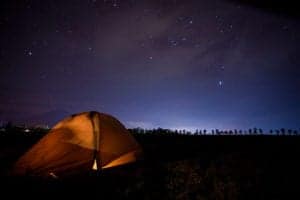Can’t sleep? It might be time to take a vacation. More specifically, it might be time to go camping.
New research from the University of Colorado at Boulder shows that even just one weekend of camping can have a long-lasting, positive effect on a person’s sleep patterns.
Lack of sleep plagues an alarming amount of people, with fluorescent lights and blue screens so prevalent, often affecting circadian rhythms in a negative way. As it happens, a return to the natural light of day and the true darkness of night can cure bad sleeping habits.

“These studies suggest that our internal clock responds strongly and quite rapidly to the natural light-dark cycle,” said Kenneth Wright, lead author and professor of Integrative Physiology at UC Boulder. “Living in our modern environments can significantly delay our circadian timing and late circadian timing is associated with many health consequences. But as little as a weekend camping trip can reset it.”
In a 2013 study performed by Wright, several campers were sent camping for one weekend during the summer, where they enjoyed natural light by day and were not allowed any type of light after sunset. In a week’s time, their circadian rhythms had synced up to the summer sun, as melatonin levels rose at sunset and waned upon sunrise. Compared to those who did not go camping, the campers were able to maintain a more regular sleep schedule.
Related: Simple Ways to Get a Better Night’s Sleep
In the second study, Wright and his team sent a group of campers out to pitch their tents for one week, this time during the winter. In this group, melatonin levels rose 2.6 hours earlier than usual, as compared to the summer study in which levels rose 1.4 hours earlier. This shows that exposure to natural light patterns during the winter can have a more potent effect on sleep patterns than in the summer.
“Weekend exposure to natural light was sufficient to achieve 69 percent of the shift in circadian timing we previously reported after a week’s exposure to natural light,” said Wright.

During the summer, campers were exposed to four times the amount of natural light during the day than what they were used to. In the winter, this amount increased to 13 times more natural light than their usual indoor environment. By absorbing this natural light and then avoiding artificial light sources after dark, the human body was able to reset itself to a more natural schedule, not only for sleep but also for metabolism, appetite and more. By aligning with the seasonal rising and setting of the sun, the human body can experience many benefits. Disrupting this natural cycle can lead to health issues, including chronic illnesses like diabetes.
While camping for a weekend can have a profound effect on sleep patterns and melatonin levels, it is important to create healthy habits to prolong the effects and encourage healthy circadian rhythms. Wright suggests making a habit of getting more natural light during the day, and banning the use of technology a few hours prior to bedtime.
Related: The Role Sleep Plays in Processing Traumatic Events
Marissa is a health and fitness writer from the Tampa Bay area. In addition to researching the latest trending topics, she enjoys instructing kickboxing classes and posting incessantly to her Instagram account.


![How To: ‘Fix’ Crepey Skin [Watch]](https://cdn.vitalupdates.com/wp-content/uploads/2017/05/bhmdad.png)












